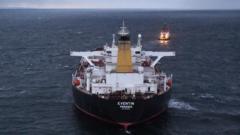Germany’s Havariekommando has mobilized tugboats to assist the stranded Eventin tanker, identified as part of Russia’s shadow fleet, raising concerns about maritime security in the Baltic Sea.
Germany Scrutinizes Russian 'Shadow Fleet' as Eventin Oil Tanker Stranded in Baltic Sea

Germany Scrutinizes Russian 'Shadow Fleet' as Eventin Oil Tanker Stranded in Baltic Sea
Authorities highlight maritime risks linked to vessels circumventing sanctions amid rising tensions with Moscow.
Germany’s maritime authorities have intervened to address a significant incident involving the Eventin, a Panamanian-flagged oil tanker, which has reportedly been stranded in German waters. This ship has been identified as a part of Russia’s controversial "shadow fleet," used to circumvent sanctions imposed by Western nations in response to Russia’s aggression in Ukraine.
Annalena Baerbock, the German Foreign Minister, attributed the incident to Russian disregard for international regulations, suggesting that President Vladimir Putin is "circumventing" sanctions by utilizing aging tankers in the Baltic Sea, thereby jeopardizing regional security. The United States, the United Kingdom, and the European Union have collectively imposed sanctions targeting Russia’s oil industry since the escalation of hostilities in Ukraine in 2022.
The Eventin, measuring 274 meters long and 48 meters wide, was found drifting north of the German island of Rügen, carrying approximately 99,000 tonnes of oil. Weather conditions complicated rescue efforts, with waves reaching heights of 2.5 meters and increasing wind gusts reported in the area. A specialized team was dispatched by helicopter to establish towing connections, and three tugboats have since taken charge of the vessel, which lacks the ability to maneuver.
As of Saturday, the convoy towing the Eventin was navigating slowly toward Sassnitz, with no oil leaks detected so far. German authorities have implemented safety measures in response to adverse maritime conditions, highlighting the risks posed not only by the stranded ship but also by potential environmental hazards.
Notably, the term "shadow fleet" refers to older vessels that lack the necessary Western insurance and frequently alter their names and registered flags to evade detection. Western nations are particularly concerned that such ships are being utilized to sustain the Russian military’s funding through oil exports.
The European Union has signaled its intent to target this shadow fleet through potential sanctions, further emphasizing the risks associated with inadequate maritime regulations and the circumvention of national laws. This move follows previous incidents in the region, particularly an undersea cable damage allegedly connected to Russia’s shadow fleet, prompting heightened scrutiny of Russian maritime activities.
As tensions escalate, Moscow has largely refrained from commenting on these accusations, maintaining a firm stance against international sanctions. The recent incident serves as a reminder of the complexities involved in maritime security in contested waters, particularly in a geopolitical landscape marked by the shifting dynamics of power, conflict, and international law.
Annalena Baerbock, the German Foreign Minister, attributed the incident to Russian disregard for international regulations, suggesting that President Vladimir Putin is "circumventing" sanctions by utilizing aging tankers in the Baltic Sea, thereby jeopardizing regional security. The United States, the United Kingdom, and the European Union have collectively imposed sanctions targeting Russia’s oil industry since the escalation of hostilities in Ukraine in 2022.
The Eventin, measuring 274 meters long and 48 meters wide, was found drifting north of the German island of Rügen, carrying approximately 99,000 tonnes of oil. Weather conditions complicated rescue efforts, with waves reaching heights of 2.5 meters and increasing wind gusts reported in the area. A specialized team was dispatched by helicopter to establish towing connections, and three tugboats have since taken charge of the vessel, which lacks the ability to maneuver.
As of Saturday, the convoy towing the Eventin was navigating slowly toward Sassnitz, with no oil leaks detected so far. German authorities have implemented safety measures in response to adverse maritime conditions, highlighting the risks posed not only by the stranded ship but also by potential environmental hazards.
Notably, the term "shadow fleet" refers to older vessels that lack the necessary Western insurance and frequently alter their names and registered flags to evade detection. Western nations are particularly concerned that such ships are being utilized to sustain the Russian military’s funding through oil exports.
The European Union has signaled its intent to target this shadow fleet through potential sanctions, further emphasizing the risks associated with inadequate maritime regulations and the circumvention of national laws. This move follows previous incidents in the region, particularly an undersea cable damage allegedly connected to Russia’s shadow fleet, prompting heightened scrutiny of Russian maritime activities.
As tensions escalate, Moscow has largely refrained from commenting on these accusations, maintaining a firm stance against international sanctions. The recent incident serves as a reminder of the complexities involved in maritime security in contested waters, particularly in a geopolitical landscape marked by the shifting dynamics of power, conflict, and international law.





















